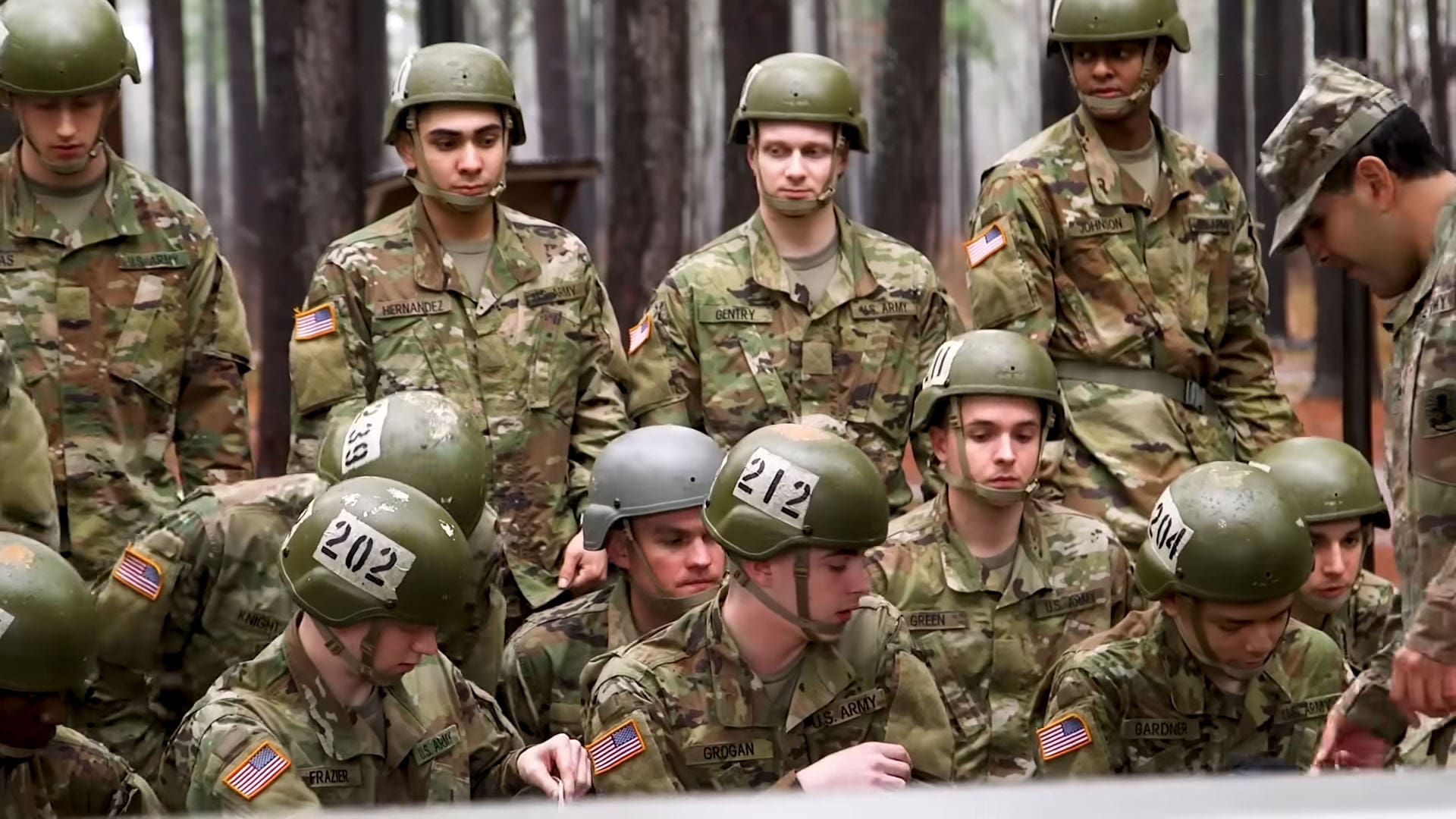Common Boot Camp Myths – Why You Shouldn’t Trust Everything You Read Online
Deciding which military branch to join is a significant choice that can influence your career path, skill development, and life direction.
Each branch has specific missions, opportunities, and roles, tailored to different abilities and interests.
By assessing your goals, strengths, and the attributes of each branch, you can select the one that aligns with your aspirations. At the same time, you should know the differences between branches.
That is why I would like to provide you with the key aspects to help guide your decision on the best military branch to join.
Key Takeaways:
- Align your interests, skills, fitness, and goals when choosing the best military branch to join.
- Explore the distinct missions and opportunities offered by the Army, Navy, Air Force, Marine Corps, and Coast Guard.
- Take advantage of benefits like education programs, career development, healthcare, housing, and VA disability compensation.
- Evaluate how deployments, relocations, and military discipline may impact your lifestyle and family.
- Consult recruiters for detailed information and veterans for practical insights into military life.
Table of Contents
ToggleSelf-Assessment

Choosing a specific military branch is an important decision that should align with your personal interests, skills, goals, and the experiences you aim to gain through service.
The first step in this process is to take a close look at your interests and skills. Consider what motivates you, the tasks you enjoy, and the areas where you excel. Reflecting on long-term goals is equally crucial.
- What fields or tasks excite you the most?
- What are your natural abilities or learned expertise?
- Can you meet the physical standards of rigorous training?
- Are you aiming for leadership, specialization, or challenges?
Your physical fitness level will play a key role. Rigorous training is a foundational aspect of military life, so readiness for this challenge is vital. Each branch has varying physical requirements, so assessing your current fitness and determining areas for improvement is essential.
Be honest with yourself about your willingness to commit to the discipline and structure required. Military life demands strict adherence to schedules, protocols, and responsibilities.
Consider Different Military Branches
Each military branch offers distinct missions, training environments, and career opportunities.
By exploring what each branch specializes in, you can identify where your skills and interests align best. Some branches focus on land operations, others on sea, air, or even space.
Each branch also has its own culture and values, shaping the experiences of those who serve.
Here is the breakdown of the key characteristics and opportunities in each branch to help you make an informed decision:
Army

The Army is a land-focused branch that offers diverse occupational specialties. Careers range from infantry and logistics to healthcare and engineering.
It is a branch that emphasizes leadership development, making it an excellent option for individuals seeking structured progression.
- A broad range of career opportunities, including combat and non-combat roles.
- Comprehensive leadership and professional growth programs.
- Training that develops physical and mental resilience for challenging environments.
Its size and scope ensure there is a role to match almost every skill set, providing stability and growth throughout your career.
Navy

The Navy centers on maritime operations and plays a critical role in international security.
The branch is ideal for individuals with technical skills or a passion for working in marine environments. Positions include navigation, engineering, aviation, and cybersecurity.
- Global deployments offer opportunities to work and serve in various locations.
- Advanced training programs in areas like nuclear technology and cyber defense.
- Strong focus on innovation and technical expertise.
Life aboard ships and submarines presents challenges but also fosters camaraderie and a sense of purpose in service.
Air Force

The Air Force focuses on aerial and space operations, making it a leader in advanced technology and innovation.
Roles range from piloting cutting-edge aircraft to managing satellite systems, making it an excellent fit for those with a background in science, technology, engineering, or mathematics (STEM).
- State-of-the-art training facilities and education opportunities.
- Emphasis on precision and analytical skills for complex missions.
- A wide array of technical and operational roles.
With its commitment to technological advancement, the Air Force provides a forward-thinking environment that encourages growth and excellence.
What is interesting about the Air Force, is that it is usually represented as the best military branch for women because of its emphasis on technical careers, education programs, and family-friendly policies.
Marine Corps

The Marine Corps is known for its rapid-response capabilities and emphasis on amphibious and expeditionary warfare. This military branch attracts individuals who excel under pressure and value teamwork and resilience.
- Rigorous training that prepares recruits for high-stakes environments.
- Opportunities in combat, logistics, and support roles.
- A reputation as the “tip of the spear” for military operations requiring speed and adaptability.
Marines are often deployed in versatile roles, making this military branch a fit for those seeking challenge and action.
Coast Guard

The Coast Guard focuses on protecting U.S. waters through maritime law enforcement, search and rescue, and homeland security.
It is a military branch that combines public service with environmental stewardship, offering roles in navigation, regulation enforcement, and life-saving missions.
- A close-knit community that fosters personalized career development.
- Dual military and civilian responsibilities that provide a variety of experiences.
- Missions that include protecting natural resources and responding to emergencies.
Its smaller size allows for a more personalized approach to service, making it ideal for those who value teamwork and mission-oriented work.
Research Opportunities and Benefits
Military service offers an extensive range of benefits that can significantly enhance your personal and professional life. These benefits include educational opportunities, career development, healthcare, and financial stability.
Exploring these perks thoroughly can help you better understand the value of service and how it aligns with your long-term goals.
- GI Bill: Covers tuition, and fees, and provides living stipends for veterans.
- Tuition Assistance: Allows active duty members to enroll in college courses at reduced costs.
- Certification Programs: Support for earning professional licenses or specialized training.
Career advancement is another major benefit, because of things like:
- Access to leadership and technical training.
- Skill-building programs in high-demand fields like cybersecurity and healthcare.
- Opportunities to transition into civilian roles with military experience as a strong asset.
The military provides robust financial and healthcare benefits. Comprehensive healthcare ensures service members and their families have access to necessary medical services.
Housing allowances reduce the financial burden of living expenses, and retirement plans provide long-term financial security.
For those with service-connected conditions, resources like VA disability compensation and updates to VA disability rates 2025 ensure financial support tailored to individual needs.
Consider Lifestyle and Commitment
Joining the military is a decision that extends far beyond the professional realm, deeply influencing personal and family life. It’s essential to thoroughly assess the terms of service, including the length of enlistment, potential deployments, and the frequency of relocations.
These aspects are integral to military life and can have lasting effects on relationships, living arrangements, and long-term plans.
Deployments can take service members away from home for extended periods, often to remote or high-stress environments. While deployments offer valuable experiences and opportunities to serve in meaningful roles, they also require resilience and support systems to manage the physical and emotional distance from loved ones.
For individuals with families, this separation may require extra planning and communication strategies to maintain strong connections.
Relocations are another significant consideration. Military life often involves frequent moves, sometimes across the country or internationally.

Speak with Recruiters and Veterans
Engaging with both recruiters and veterans is a critical step in making an informed decision about military service. Recruiters are the official representatives of their respective branches and can provide detailed information on the roles, responsibilities, and benefits of enlistment.
They are equipped to answer questions about career opportunities, training programs, and enlistment processes. Veterans, on the other hand, offer first-hand insights based on their personal experiences, shedding light on what military life is truly like.
Recruiters serve as a valuable resource for understanding the technical details of enlistment and service. They can explain the specifics of contracts, benefits, and career progression, as well as help you identify roles that align with your skills and interests.
- What career paths and specialties are currently in demand?
- What are the physical and educational requirements for specific roles?
- How does the branch support long-term career development and education?
Veterans bring a different perspective, offering candid advice about the realities of military life, including challenges and rewards. They can provide practical tips on adapting to the structure, discipline, and demands of service. Their experiences often reveal nuances that may not be covered in conversations with recruiters.
- What were the most rewarding and challenging aspects of their service?
- How did military life impact their personal relationships and daily routines?
- What advice do they have for someone considering enlistment today?
Evaluate Training and Advancement
Soldiers pose for a selfie during a joint live-fire exercise. Check out the Regionally Aligned Forces Pre-Deployment Training Message update at: https://t.co/pFtgSa1ktD #SoldierSelfieSaturday #USArmy pic.twitter.com/rO2x0uwYho
— ArmyTrainingManagement (@ArmyTrainingNet) April 14, 2018
Training and advancement opportunities are central to military service, offering a structured path for skill development and career growth. Each military branch has its training programs tailored to its mission, providing recruits with the tools they need to succeed.
- Discipline
- Teamwork
- Physical fitness
This phase prepares recruits for the challenges ahead, while also introducing them to the values and expectations of their chosen branch.
The intensity and focus of basic training may vary by military branch, but all emphasize resilience and adaptability.
Advanced training follows basic training and allows service members to specialize in a specific role. These programs include technical training, leadership courses, and certifications tailored to each branch’s operational needs.
For example, the Air Force emphasizes aerospace and cyber operations, while the Navy offers advanced training in navigation, engineering, and nuclear technology.
- Basic Training: Focus on discipline, teamwork, and physical fitness.
- Advanced Training: Opportunities for specialization in technical or leadership roles.
- Branch-Specific Focus: Tailored programs that align with each branch’s mission.
Promotion structures within the military are designed to reward performance, dedication, and leadership potential.
The Bottom Line
Choosing the right military branch is a significant decision that requires careful thought and preparation.
Speaking with recruiters and veterans, researching available opportunities, and considering how military life fits into your circumstances are all critical steps.
Taking the time to assess these factors will help you embark on a path that matches your ambitions and sets the foundation for a successful and fulfilling military career.
Related Posts:
- A Detailed Guide to Military Branch Colors and Their Meaning
- How Old Can a Woman be to Join the Military? Joining…
- Can You Join the Military with ADHD? What to Know
- Can You Join the Army with Scoliosis? What You Need…
- How to Join the Space Force - Step-by-Step Guide
- A Look at US Military Helicopters: Past, Present, and Future







